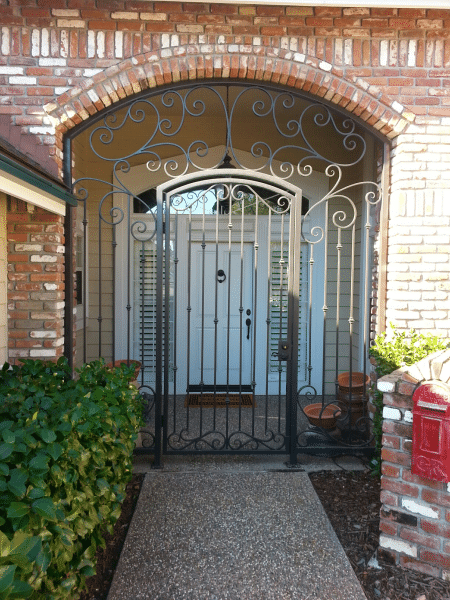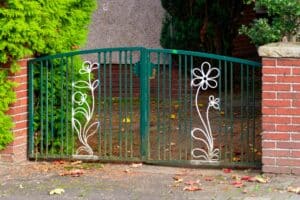Before We Start: A Quick Comparison
| Feature | Iron Gates | Wood Gates |
|---|---|---|
| Design Customizability | High customizability with options for intricate designs and details. Gaps between bars can be creatively managed. | Good customizability, but designs are added atop the base material. No gaps between panels for a seamless look. |
| Security | Extremely durable and resistant to force. Gaps between bars may pose minimal security concerns. | Strong when made from high-quality, reinforced wood. Smooth tops can be climbable. Prone to splintering under excessive force. |
| Longevity | Can last for decades with minimal maintenance. Resistant to most damage, except for potential rust in certain climates. | Durable with proper treatment, but more susceptible to weathering and physical damage than iron. |
| Maintenance | Low maintenance. Occasional rust repair may be required, which can be costly but is infrequent. | More frequent maintenance to address rot, sagging, and wear. Repairs can be simpler and cheaper than iron but are needed more often. |
| Cost | Generally more expensive upfront, but long-term durability may offset initial costs. | Less expensive upfront but may incur higher maintenance costs over time. |
| Aesthetic Appeal | Offers an elegant, classic look that can complement the architectural style of a home. | Provides a warm, natural appearance that can blend well with the surrounding landscape. |
| Ideal Use | Suited for properties requiring high security and a timeless design. | Best for those seeking a natural look and willing to invest in regular upkeep. |
Choosing the Right Gate for Your Home: Iron vs. Wood
Your gate is more than just an entryway—it’s a first impression, a security feature, and a long-term investment in your home’s aesthetic and functionality. One of the most common dilemmas for homeowners is choosing between iron and wood gates. Both materials have unique advantages and drawbacks, and the right choice depends on your priorities.
To help simplify your decision, we’ve evaluated iron and wood gates based on these key factors:
- Design Customization: How easily can the gate reflect your personal style and enhance your home’s exterior?
- Security: How effectively does the material deter unauthorized access and withstand damage?
- Durability: What’s the gate’s lifespan, and how well does it hold up over time?
- Maintenance Needs: How much upkeep does the gate require to remain in prime condition?
Not sure what material is best for you? Take our quiz.
Design Customization: Iron vs. Wood
Iron Gates
Iron gates, particularly those made from wrought iron, are known for their exceptional malleability when heated. This allows for endless customization options, from ornate scrollwork to sleek, minimalist designs.
- Advantages:
- Intricate details like decorative finials, curved bars, and custom logos can be incorporated seamlessly.
- Works well with various architectural styles, from classic to modern.
- Gaps between bars can be minimized with creative layouts for a cohesive look.
- Considerations:
- The gaps between bars might not suit those who prefer complete privacy. Additional design elements like frosted panels can help address this.
Wood Gates
Wood gates provide a seamless, solid appearance that can add warmth and charm to any property. Unlike iron, the design is typically achieved through layering decorative elements on a solid base.
- Advantages:
- No gaps between panels, offering complete privacy.
- Works well in rustic, natural, or traditional landscapes.
- Stains and finishes can be tailored to complement your home’s palette.
- Considerations:
- Limited design flexibility compared to iron. Custom elements can obscure the gate’s natural beauty.
Security: A Comparative Look
Iron Gates
Iron gates are synonymous with strength and durability. They resist significant impact and remain difficult to breach.
- Advantages:
- Can withstand heavy force without breaking.
- Resistant to cutting or tampering with standard tools.
- Often installed with locks or automation systems for enhanced security.
- Considerations:
- Gaps between bars, while typically narrow, might allow access to small intruders or objects.
Wood Gates
Wood gates can be highly secure when crafted from dense hardwoods like oak or mahogany and reinforced with metal.
- Advantages:
- Solid construction makes them difficult to see through, adding an extra layer of privacy.
- High-quality wood with reinforcement can rival iron in strength.
- Considerations:
- Smooth surfaces may be climbable.
- Prone to splintering under excessive force, potentially weakening the structure.
Durability: Iron’s Timelessness vs. Wood’s Warmth
Iron Gates
When properly treated, iron gates can last a lifetime—or longer.
- Advantages:
- Resistant to most environmental factors like wind, pests, and UV exposure.
- Longevity often exceeds 60 years with minimal wear.
- Regular coatings or galvanization can prevent rust even in humid climates.
- Considerations:
- Without proper maintenance, rust can develop in particularly wet or salty environments.
Wood Gates
Wood gates offer a naturally beautiful aesthetic but require extra care to maintain their lifespan.
- Advantages:
- Treated and sealed wood can last 15–20 years or longer.
- Repairing wood is generally easier and less costly than repairing iron.
- Considerations:
- Susceptible to weathering, warping, and pests like termites if not treated regularly.
- Requires more frequent upkeep to avoid rot and discoloration.

Maintenance: Keeping Your Gate Pristine
Iron Gates
Iron gates are relatively low-maintenance, especially when treated with durable coatings.
- Advantages:
- Requires periodic inspections for rust and occasional touch-ups.
- High-quality finishes like powder coating can extend the time between maintenance cycles.
- Considerations:
- Rust repairs, though infrequent, can be costly if neglected for too long.
Wood Gates
Wood gates require more consistent maintenance to remain functional and attractive.
- Advantages:
- Rot, sagging, and minor wear are often easier and cheaper to address.
- A fresh coat of stain or paint can restore its original beauty.
- Considerations:
- Maintenance must be regular, including sealing, staining, and repairing potential damage. Wood gate maintenance is more common, dealing with rot, sagging, or wear. Though repairs can be simpler and cheaper than iron, they’re needed more often.
Your Decision: Iron or Wood?
While we, as an ornamental iron company, have our preference, the choice ultimately depends on your priorities. Both iron and wood gates offer distinct advantages and can significantly enhance your home’s appeal and security.
Cost Considerations and Longevity
On average, metal fences tend to be pricier than wood, but the investment might be justified by their durability and aesthetic value. Wrought iron fences, with proper care, can grace your property for over 60 years, far outlasting wooden alternatives.
- Iron Gates:
- Higher upfront cost, but the long-term durability and minimal maintenance often justify the expense.
- Resale value is enhanced due to their timeless appeal and longevity.
- Wood Gates:
- Lower initial cost but higher long-term maintenance expenses.
- Ideal for those who prefer a natural look and are willing to invest in upkeep.
Final Thoughts
Our fabricators are eager to transform your home. Get My Free Design Consult
Your home’s gate is more than a barrier; it’s a statement of style and a commitment to security. Whether you lean towards the timeless elegance of iron or the natural charm of wood, make sure it reflects your taste and meets your needs. For those drawn to the strength and durability of metal, our team is ready to bring your vision to life with a free design consultation.
Remember, the best gate is on that you’ll be proud to open every day. Choose wisely, and transform your home into a fortified sanctuary of beauty.



